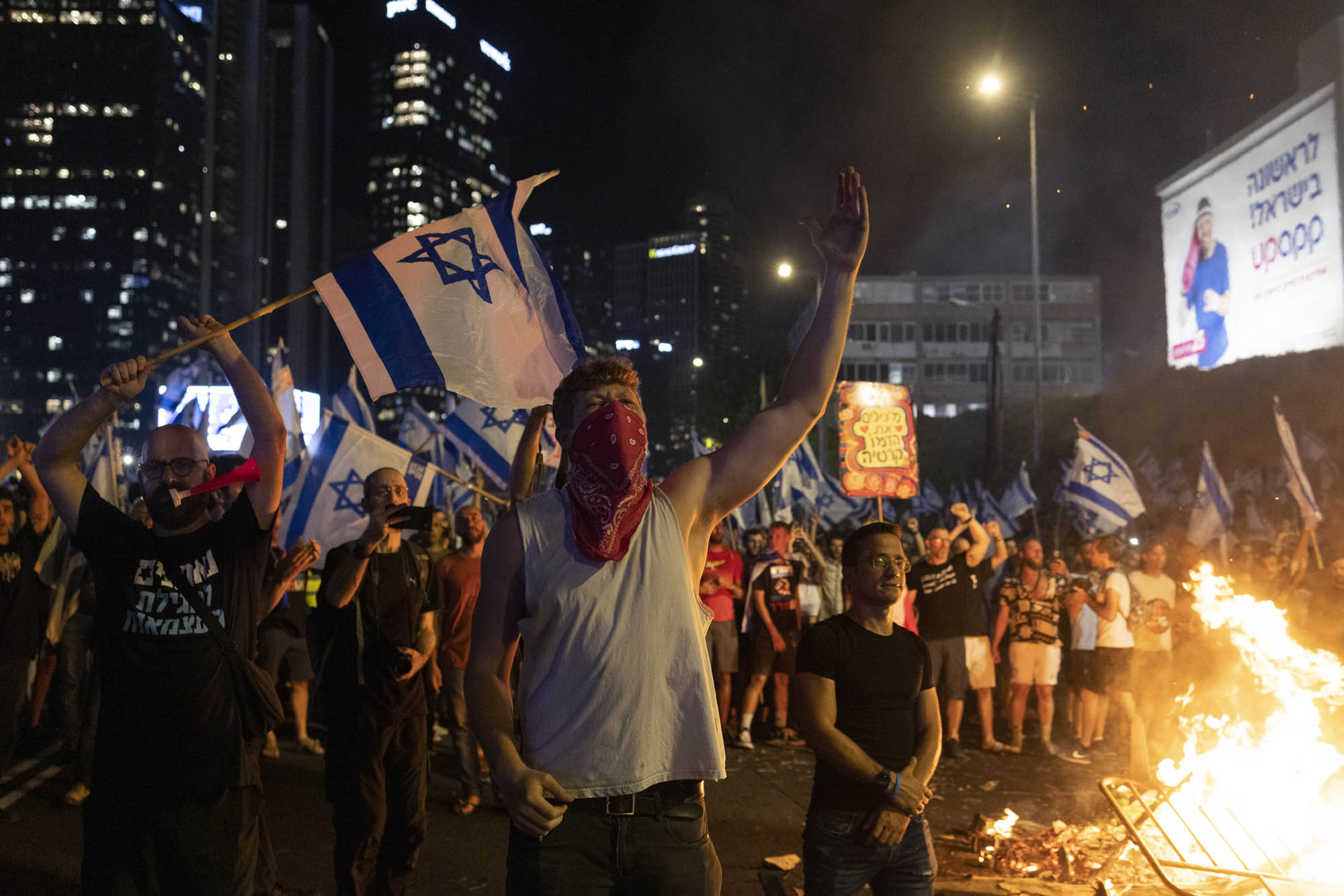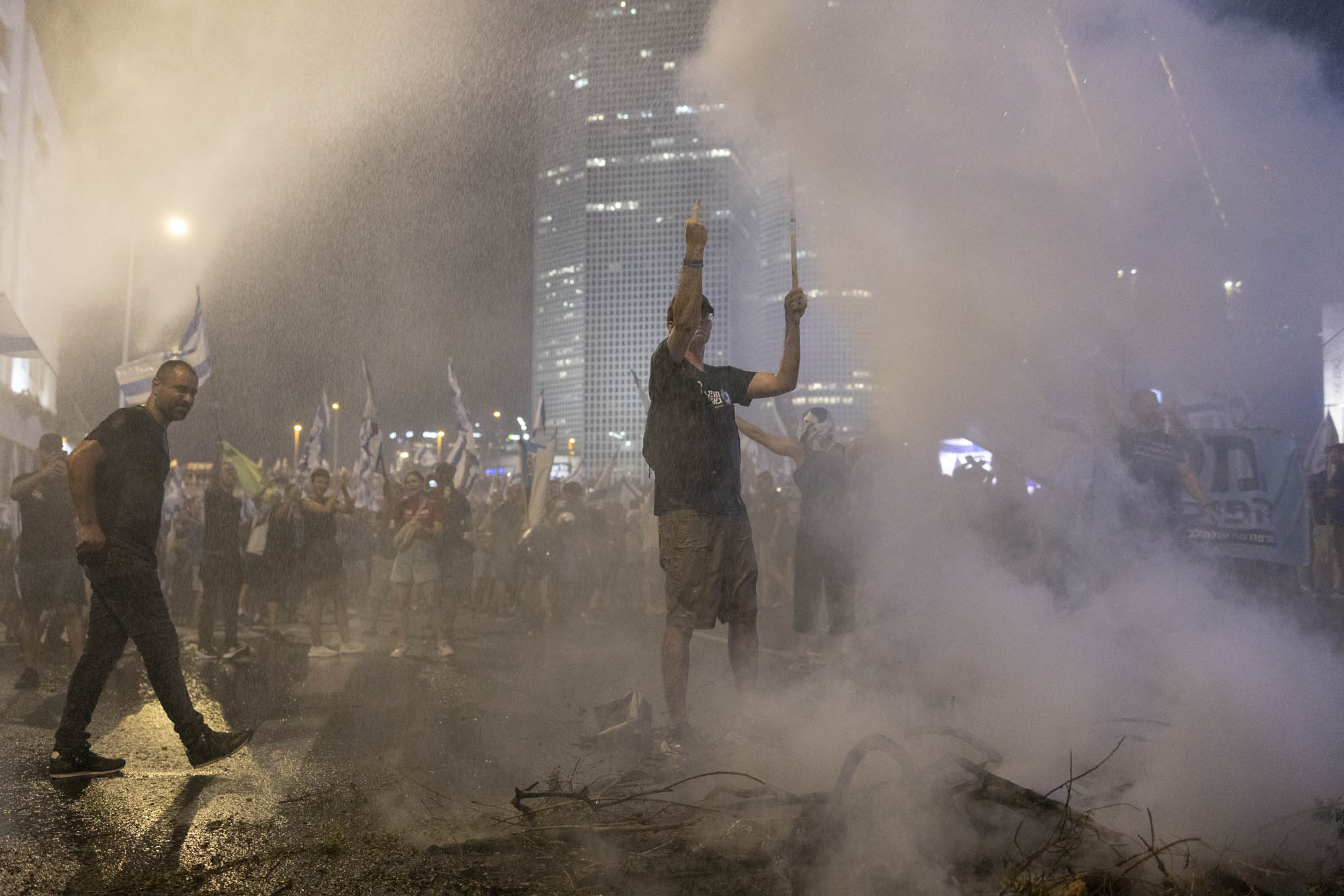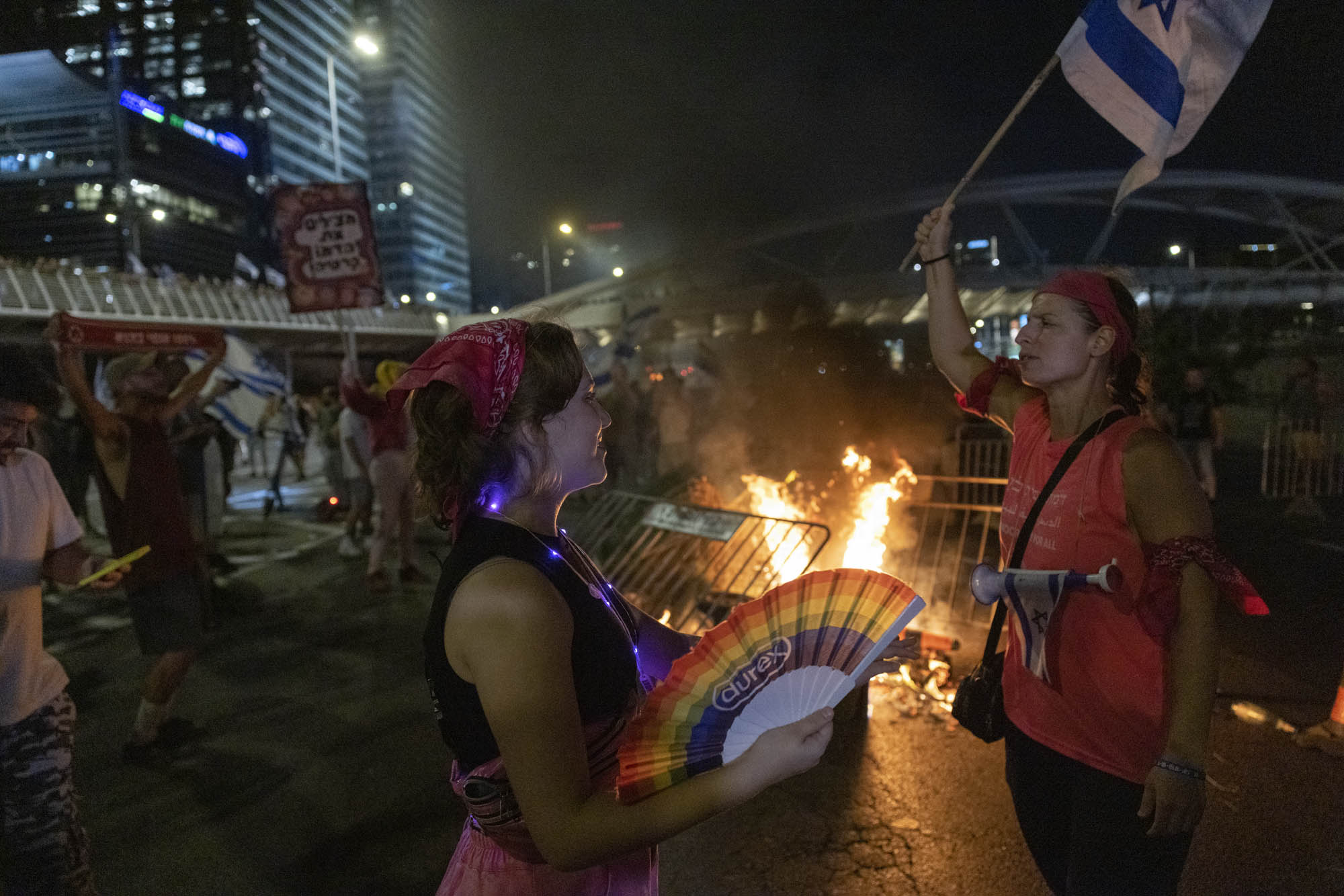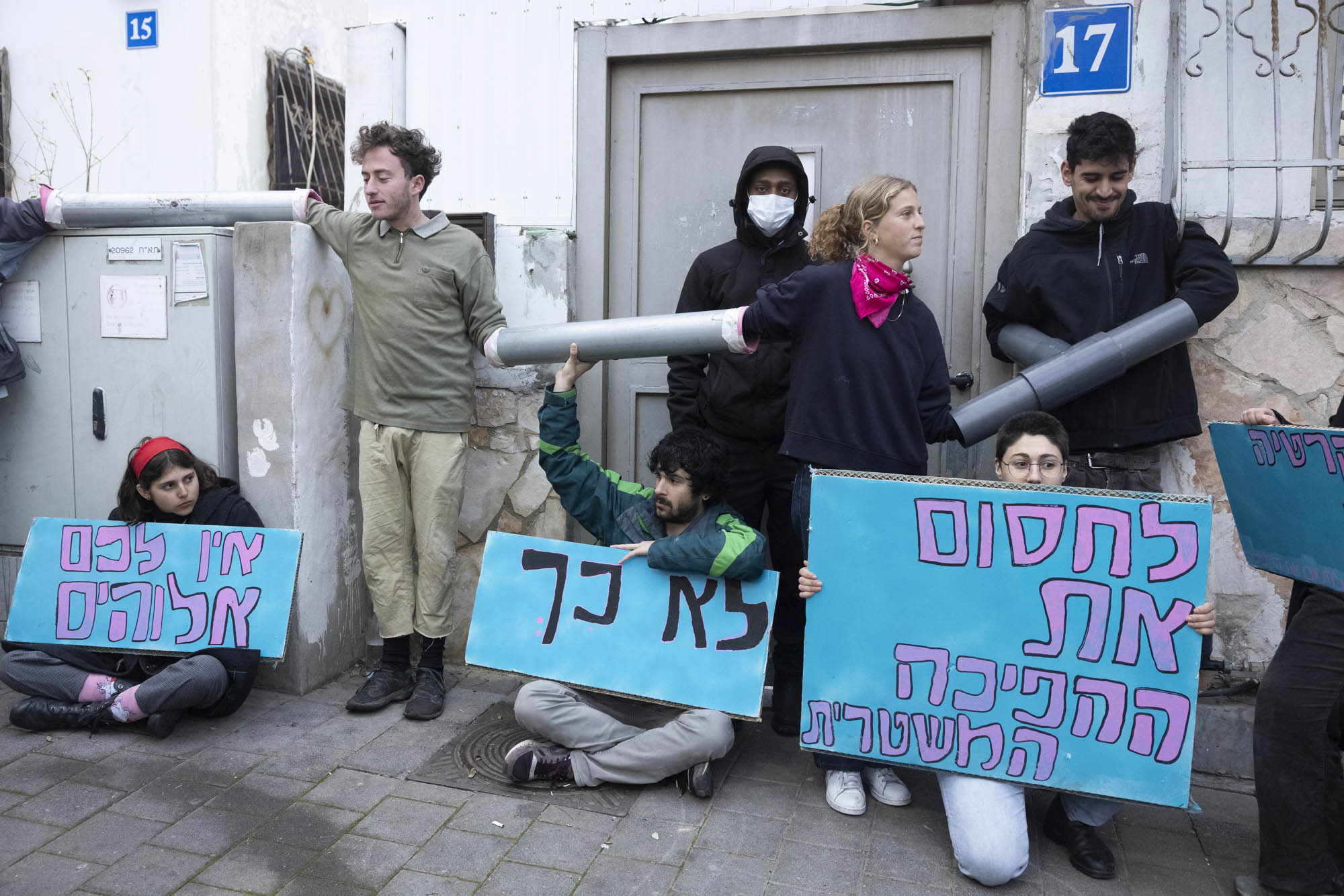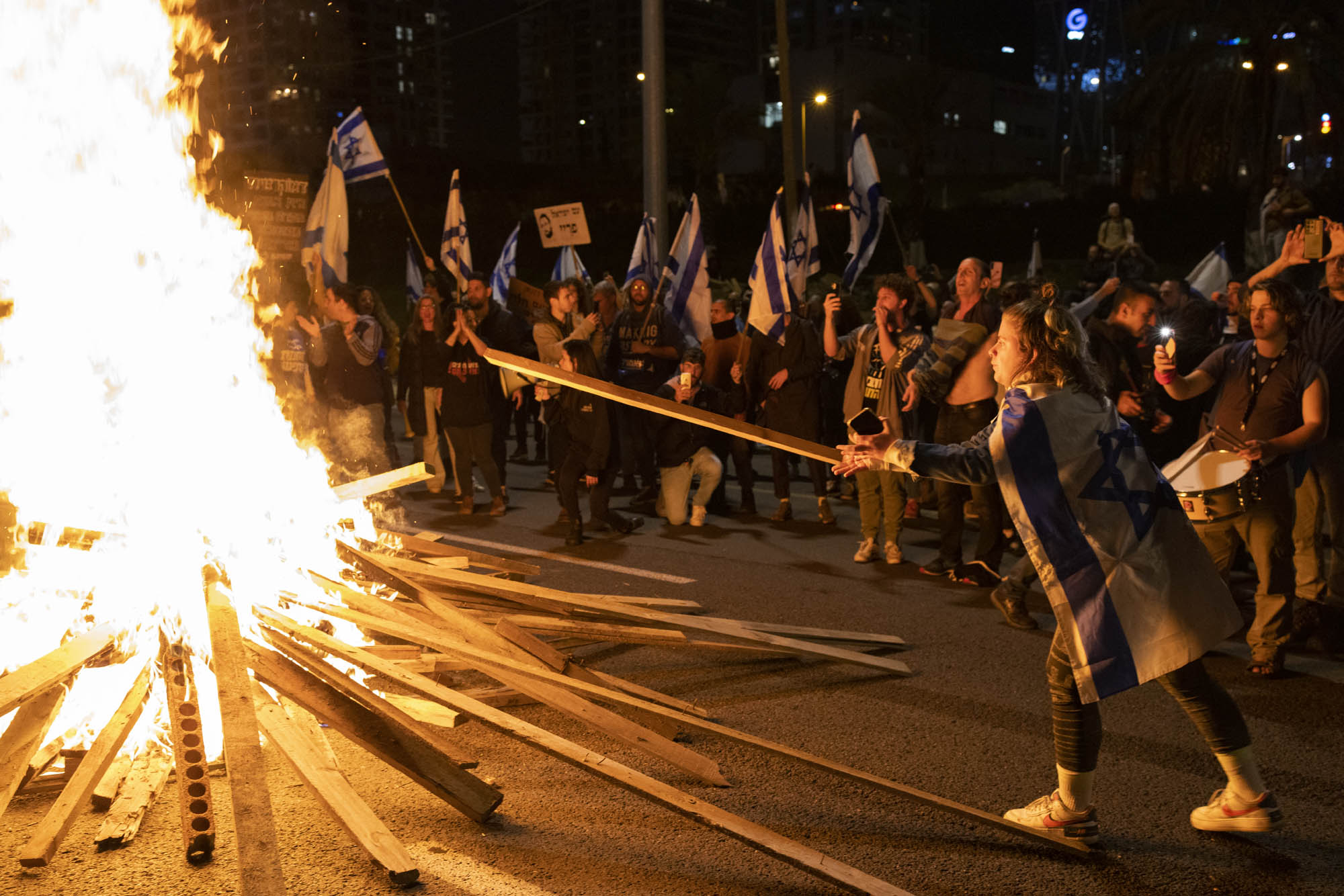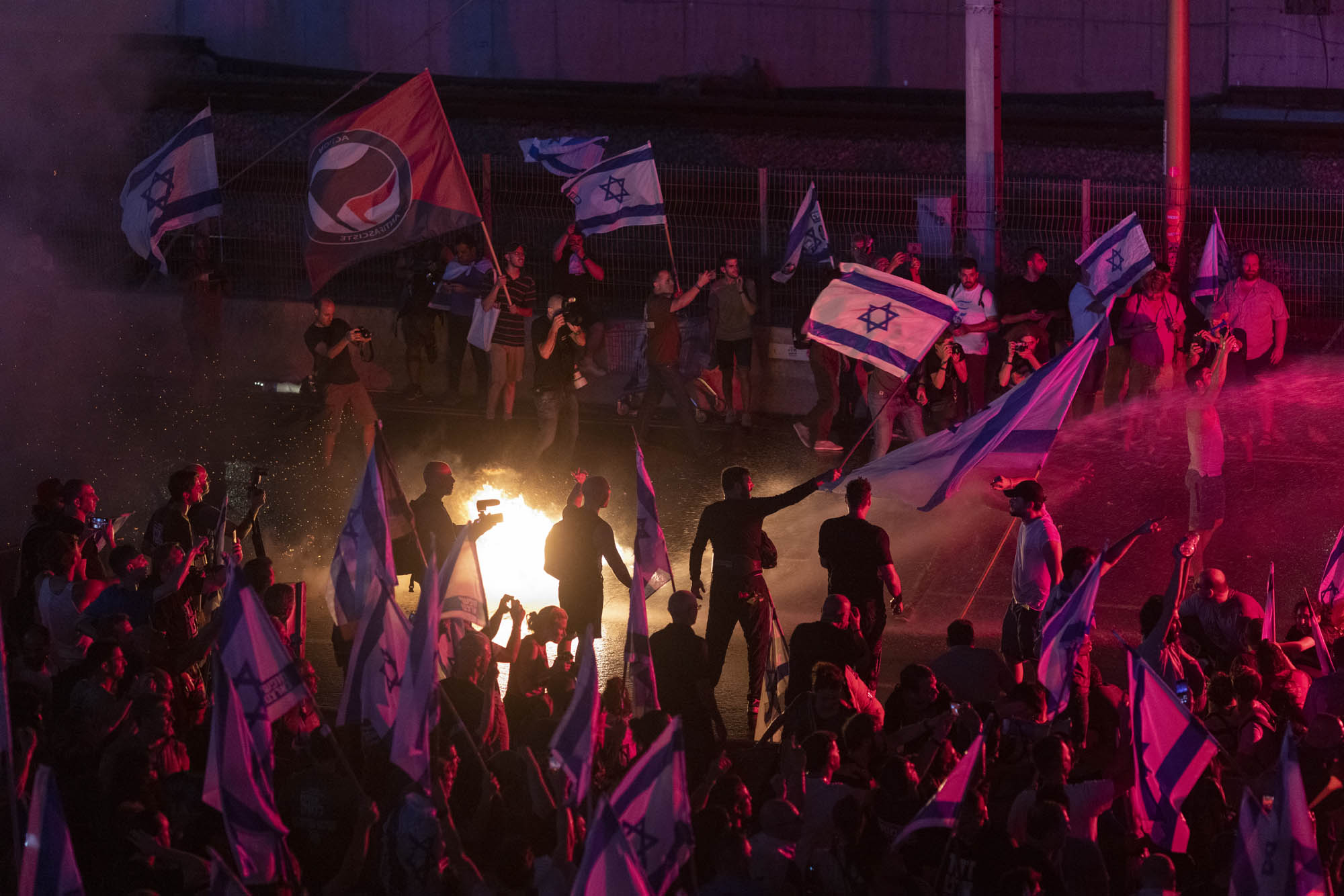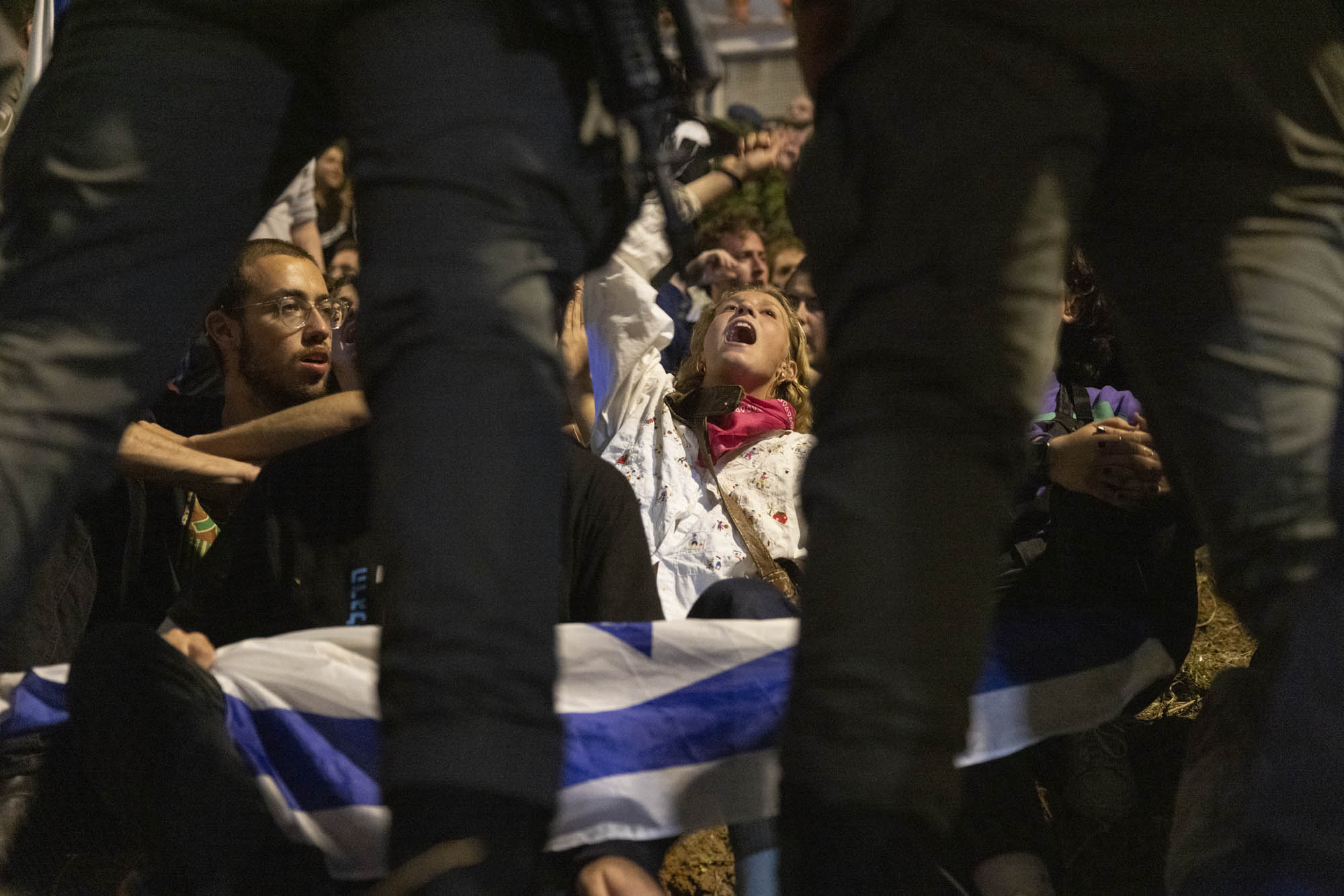The mass anti-government demonstrations that have taken over Israel’s streets since the start of the year are notable for several reasons — not least the unprecedented number of people that have mobilized, and the assertiveness of the protesters in their confrontations with the police. As the months have gone on, however, another feature has become impossible to ignore: the presence of young people at the forefront of the demonstrations.
Last month, for example, after the Knesset passed the first law in its package of legislation aimed at disempowering the judiciary — a bill abolishing the so-called “reasonableness standard,” which the High Court used to overrule certain government decisions and appointments — thousands of Israelis blocked major roads in Jerusalem and Tel Aviv in what were particularly fervent demonstrations. The majority of these protesters appeared to be in their early twenties, with many even in their teens.
This salient presence of youth raises important questions about how so many Israelis who were born and raised almost exclusively under Benjamin Netanyahu’s rule ended up taking such mass direct action — exposing themselves to the risk of arrest and police violence in the process. Indeed, how is it that a generation that largely refrained from protesting, and that grew up in an era characterized by the post-Oslo doctrine of “managing the conflict,” the near-total collapse of the left, and with many turning away from politics altogether, suddenly finds itself setting fires on highways?
+972 spoke with several of these young demonstrators, ranging from their late teens to their early thirties, to understand these questions and more.
‘Unreasonable resistance’
The young Israelis interviewed for this article consistently referred to the far-right government as having broken the social contract between the state and its citizens. Once this happened, they said, they had no interest in going back to the way things were.
In contrast to the protest movement’s more veteran leaders, younger participants have no nostalgia for a lost “democratic paradise.” The difference between the two age groups is clear from their respective slogans: while on the main stage on Tel Aviv’s Kaplan Street, the older protesters talk about a return to “the beautiful and good Land of Israel” of old, the youngsters’ handwritten signs convey a different message. “Polite gays don’t make revolutions,” said one sign, while another read: “The solution is unreasonable resistance.”
Indeed, young people at the protests frequently expressed that they are not content with merely repelling the judicial overhaul or even ousting the current coalition. Rather, they want to see resolutions to much deeper issues in Israeli state and society, including the separation of religion and state, equality for women and LGBTQ people, and even an end to the occupation over Palestinians.
As such, for many of these youths, the settler pogrom in the Palestinian town of Huwara last February was as much of a motivation to take to the streets as the judicial coup. They feel that the nationalist, religious, settler government is advancing policies that contradict all their values — and that this is their last chance to resist.
Tal Schwartz, a 24-year-old who joined the student demonstrations in Jerusalem, first became active as a protester through the current movement. “Most of my life I remember being under Bibi,” she said. Now, she and her peers are “united around the same feeling” of disappointment with the current situation, even if they don’t agree on the solution.
Tzvia Guggenheim, also 24 and a student at Shalem College in Jerusalem, grew up in a religious household in the Efrat settlement in the occupied West Bank, and describes herself as “conservative and religious.” Although her college is typically right-leaning, she said, around half of the 200-strong student body is now involved in the anti-government protests.
Guggenheim remembers her parents taking her to a demonstration against the Gaza disengagement when she was just six years old; later, the religious school she attended took her to a nationalist rally during a period of Palestinian terrorist attacks. But the current wave of protests marks the first time Guggenheim has independently joined a demonstration. “I didn’t really understand what to do in a protest. I felt out of place,” she said.”
But her current participation did not come out of the blue. She had been volunteering at an organization working with women who were trapped in abusive or unhealthy marriages because their husbands were refusing to grant them a divorce; the misogynistic and homophobic statements she heard there pushed her to go to the demonstrations, she said.
“Most people in the government want the [judicial] coup because it will allow them to establish a fundamentalist religious state,” Guggenheim explained. And for her, the state can look only one of two ways: “Jewish [and] very particularistic, or democratic.”
‘This is a wake-up call’
Ya’ara Better Pocker, a 23-year-old protester from Tel Aviv, said that the prominent presence of young people marks a rebellion against their parents’ generation. According to her, many youths feel that they are having to pay the price for other people’s choices from the past. She also cited the Huwara pogrom as a turning point that “opened people’s eyes to the horrors of the occupation” in a way that hadn’t happened before.
“Some people have no idea what is going on in the [occupied] territories, but they saw the photos from Huwara and understood the connection between [that] and the army and the settlers,” she said. “The discourse surrounding [military draft] refusal is also stronger than it was six months ago. There’s an understanding of the price that the army extracts from the collective psyche.”
Omer, 23, who was previously involved in climate activism, is now a member of the protest group Bottom Up Constitution, which has undertaken dozens of direct actions in recent months, including blocking the Knesset and politicians’ homes. He admitted his surprise at the way the current movement erupted in Israel.
“I was in shock, because this is an obedient society, but we apparently reached a tipping point,” Omer said. “[Young people] feel there is a concrete threat to them and to those close to them. It is clear to everyone that things are shit for the Palestinians and that there’s a climate crisis, but for the first time they feel that everything is collapsing for them too, for the privileged.
“The current situation brought people who never thought they would be beaten or arrested to be ready for it,” Omer continued. The fact that so many previously non-political people were getting involved, he said, made him optimistic.
Gidi Baran, 21, who was arrested in June at a protest outside Prime Minister Benjamin Netanyahu’s home in Caesarea, expressed similar sentiments during a speech he gave at the Kaplan stage a few Saturdays ago. Baran recounted how police blindfolded him, knocked him out, and transferred him to different police stations, while preventing him from getting medical assistance and withholding information from his lawyers.
“For years, one side accommodated and accommodated, and extremists on the other side planned how to destroy. Now our generation is shattered from within and fed up,” Baran told the 200,000 protesters at Kaplan Street. “We are a much less patient generation, and we will not accept any more racism or homophobia. We will not serve a dictator, and we will not live in a halakhic state. This will not happen on our watch, and those who burn down homes in Huwara are not our brothers … The current protest is not just a lesson in citizenship — it is primarily a wake-up call.”
‘The illusion has been shattered’
The anti-government movement has been characterized by its participants’ willingness to go head-to-head with the police, and its use of tactics that were previously the exclusive domain of the radical left and climate activists — such as blocking roads, lighting fires, and demonstrating outside politicians’ homes. The younger cohort in the movement is no exception.
“I didn’t really support crossing [police] barricades and that kind of thing,” said Schwartz, but “after it happens a few times, you are exposed to things. A police officer shoved me into a bush as I was on my way home. We have reached a point where in order to show resistance, it’s not enough to speak on a stage — you have to use other tools.”
Omer recalled that when Bottom Up Constitution first blocked the entrance to the home of Likud MK Tally Gotliv, a staunch supporter of the judicial overhaul, opposition politicians condemned their actions. Now, their tactics — like locking themselves together using plastic pipes and chains, inspired by climate activists — have been adopted across the movement.
For example, Brothers in Arms, a protest group made up of veteran military reservists, blocked the entrance to the Israeli army headquarters in Tel Aviv a few weeks ago, and on the day of the Knesset vote on the reasonableness standard, thousands blockaded the parliament building on all sides for hours amid mass protests in Jerusalem.
With its methods proving far more successful than they anticipated, Bottom Up Constitution has taken on an additional role: de-escalation. “If someone starts cursing at the police, we try to calm them down,” Omer explained. “If there are mounted police, we make sure people don’t throw bottles [at them]. We sit and join hands, bringing in a practice of nonviolence.”
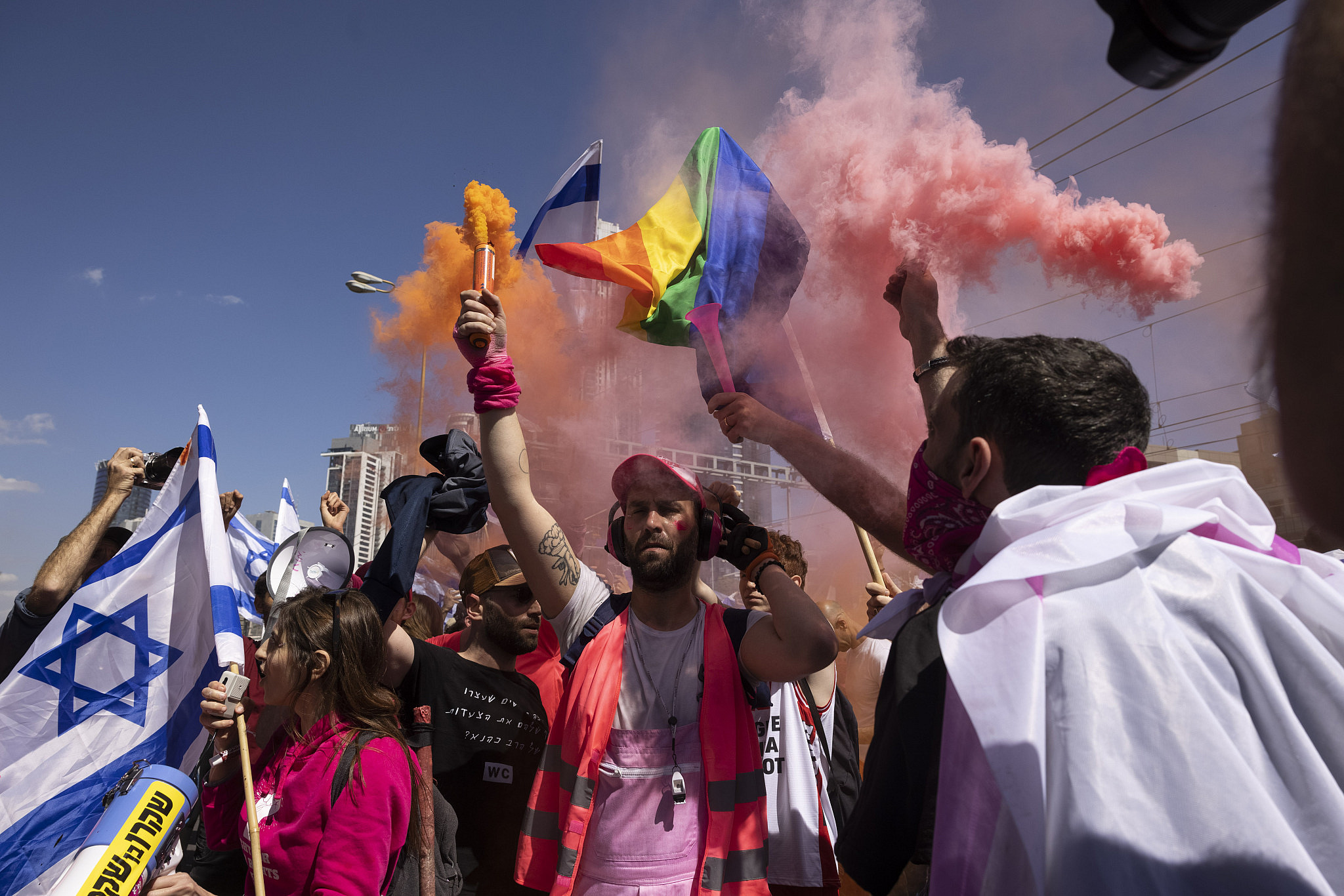
Yaniv Segal, 33, is one of the founders of the Pink Front — an LGBTQ-led group that formed amid the “Balfour Street” protests that broke out surrounding Netanyahu’s corruption charges in 2020, and which has returned to action in the current movement. “There is a real youthful vibe,” Segal said of the group, “but we’re not ageist.”
Segal was born not long before then-Prime Minister Yitzhak Rabin was assassinated in 1995, and despite the Palestinian suicide bombings of the Second Intifada, he felt relatively safe and secure in society about his identity. “I had no problem being gay. We weren’t interested in politics. Now we’ve had a slap in the face. It’s good — for our generation and the next one, the illusion has been shattered.”
While there was a similarly prominent LGBTQ presence at the Balfour protests, Segal said, what has changed now is the connecting of seemingly different issues. “As soon as we succeeded in linking these protests to [the queer struggle], it brought LGBTQ protesters to us. We encompass the liberal discourse on every side. Liberals, women, and Arabs against fascism, against the destruction of villages, from right-wing people to the anti-occupation bloc. The more it progresses, the more bridges we will find.”
‘We are angry and we show it’
Many of the twenty-somethings interviewed for this article thought of “youngsters” as the teenagers who became prominent in the protests after the vote to abolish the reasonableness standard. The “Ayalon youth,” as they can be termed — in reference to the main highway onto which protesters often descend from Kaplan Street to block traffic during the Tel Aviv demonstrations — are seen as a kind of counter movement to the hilltop youth in West Bank settlements. However, in contrast to the settlers and the police, the Ayalon youth do not act violently, except in exceptional cases.
This cohort is mostly made up of high school students or youth about to be drafted into the Israeli army. They only witnessed the Balfour protests online or in the news. They show up only for the “days of rage,” not for protests with scheduled speeches. They are not organized into any clear group, and in general do not have a background of political education. Most importantly of all, many of them are unafraid, and do not cover their faces or try to avoid being photographed standing in front of the police or lighting bonfires.
“It was extreme,” said Lily, a 17-year-old high school student, describing the night she helped block the Ayalon highway after the reasonableness standard was struck down. “The police were more combative, and honestly so were the protesters. It was scary and exciting. These are the things you read about in history lessons, [and] suddenly it’s not theoretical, it scares everyone.”
Her friend Lior, 18, who was also there that night, explained the logic behind the bonfires, which have captured the public’s attention and have been used by the police to portray the protesters as violent. “There’s a difference between throwing a bottle at a police officer and lighting fires,” Lior said. “[Fires] seem to be violent, but they do not hurt anyone. They’re a means of saying: You’re not listening to us, so we’ll start a fire, something that you cannot ignore.”
Regarding the difference between the adults protesting and the youth, Lior explained: “For them it is managed through organizations and representatives, whereas for us it is through friendships and informal organizations. We are angry and we show it.”
The speeches on the main Kaplan stage each week thus do not interest the youth. “I haven’t listened to a speech since the umbrella demonstration [one of the earliest demonstrations in January, immortalized by images of tens of thousands of protesters sheltering from the heavy rain under umbrellas]. The calls for democracy are crass. We’ve been at this for half a year, and we don’t want to go back to the situation as it was.”
Lily concurs: “[We don’t want] to go back to the old order of supposed democracy or democracy for Jews only, but for all.”
‘There is more courage and less fear’
“It was madness,” said Shahar, a protester in her early twenties who participated in the blockade on Ayalon after the reasonableness bill passed. “People were blue from the water cannon [police sometimes fire blue-dyed water to mark people for arrest]. I was pleasantly surprised by the resistance.
“Our problem is that everyone [in these protests] is rich and white,” she continued. “We must learn from the Palestinians how to fight — they have nothing to lose … I went out into the street because it’s shit here, it’s hard, because [National Security Minister Itamar] Ben Gvir is a terrorist, and because I want to marry my female partner.”
Yael, 18, recently graduated from high school and is a member of Bottom Up Constitution. Active in previous demonstrations, she felt that the current protests were initially “very institutional and conservative.” But since then, she said, “it has developed into disobedience. It’s easy to interpret this as violence, but for me violence is harming living things — humans and animals. Disobedience is powerful when it is nonviolent.”
Yael explained that while at the beginning she was one of a few in her class who attended the demonstrations, “now many people come. Somehow it became mainstream. People were waiting to take to the streets … There is a feeling that there’s nothing to lose, a collective feeling of desperation. In such situations there is more courage and less fear of being arrested.”
Stav Shomer, 28, was active at the Balfour protests, but admits that today he barely knows any of the protesters. “The young people blocking Ayalon know that it will not save the country, but they are looking to vent their anger,” he said. “They could go to pubs or the beach, but instead they go to get beaten up by the police. That’s nothing to sneeze at.”
The difference to Balfour, he believes, is significant. “At Balfour I knew who was organizing. Here I know maybe five people, and I don’t know what’s going to happen.” As an example, he cites the lighting of fires even before police arrive: “At Balfour it happened a few times, but now it’s the norm. They’re not anarchists, they’re good kids, a bit hipster, who are simply not afraid. The more violence the police use, the stronger they resist.”
‘The police give us victory photos’
Police violence reached its peak during the demonstration following the abolition of the reasonableness clause: officers fired skunk water at protesters in Jerusalem, while in Tel Aviv there was a combined attack by special forces units, mounted officers, and water cannons.
Since March, more than 1,220 protesters have reported that they were attacked by police officers, according to statistics gathered by the “Israel Violence” platform. And the increase is steep: in March, 56 incidents were reported, while in July the number reached 286.
Meanwhile, according to the Detainee Support Network, around 960 protesters have been arrested during anti-government demonstrations since the start of February. They report that “the age of the detainees is quite heterogeneous,” but note that there is a trend of more young people being arrested, including “minors and those due to enlist in the IDF.”
Omer, 26, was recorded suddenly being violently attacked by police officers while he sat on the road in Ayalon. He told +972 that he comes “on and off” to the demonstrations, but on the day the bill passed, he got on his bike and went to Ayalon.
“I met friends and we saw the water cannon approaching,” he recalled. “We sat with our backs to the water cannon and held tight. Several police officers jumped on each of us and started hitting us, punching us, trying to separate us from each other.
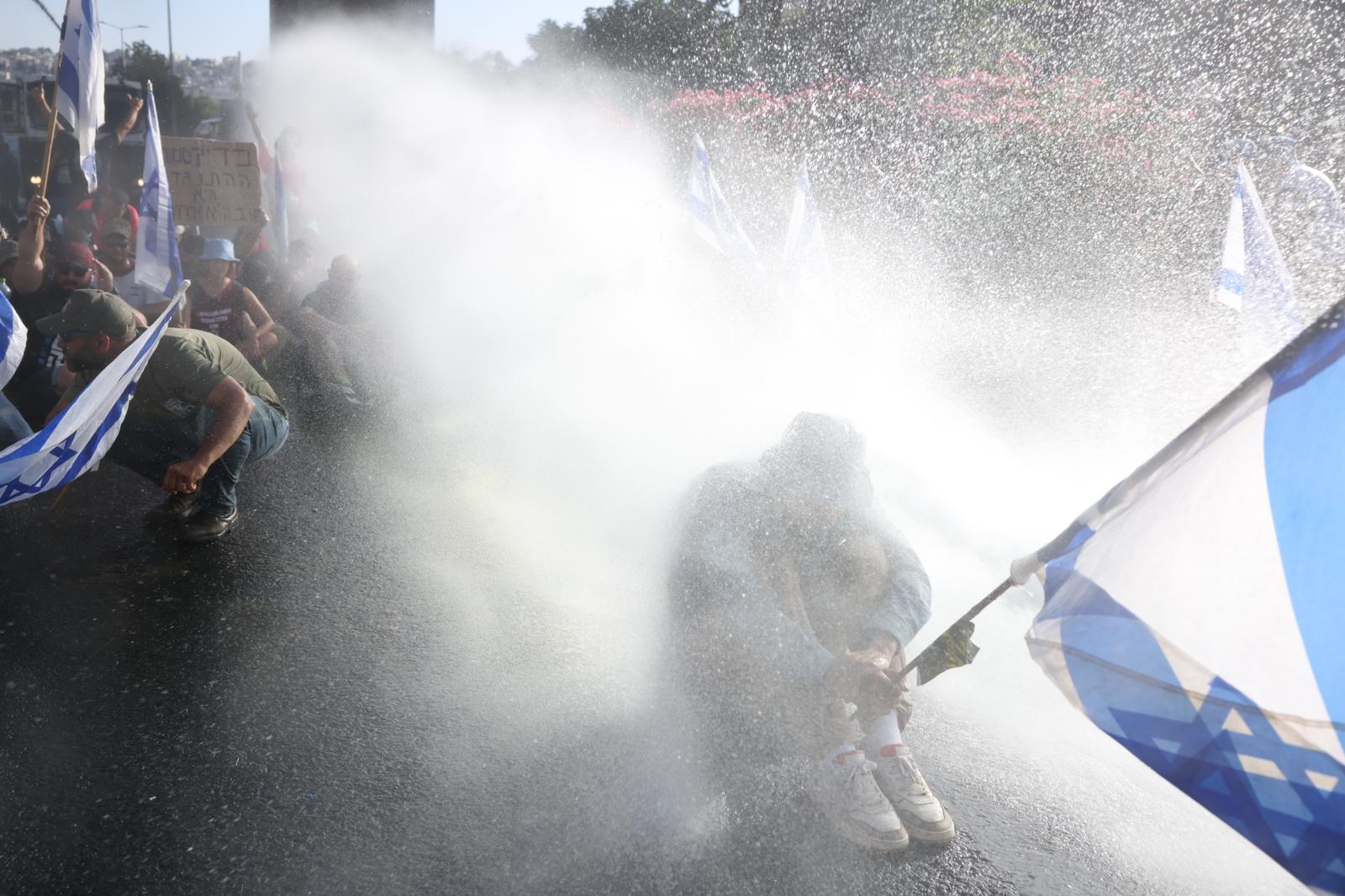
“I yelled at them: ‘What are you doing? I’m not touching you,’” Omer continued. “They continued beating us. I defended myself and covered my head, and screamed. Maybe my yelling stressed them out, and after a few seconds they left me and went to freshen up for the next session. My face was red with blood, but I was full of adrenaline and I didn’t realize I was in pain until an ambulance arrived and took me to the hospital.”
Despite now resting at home and requiring painkillers, Omer vows that he’ll be back at Ayalon. “[The police] only give us victory photos, which strengthen the protest.”
Omer comes from a political family, and his parents used to take him to demonstrations organized by the veteran peace movement Peace Now. “I have a hard time with people who say that until now it was good here,” he added. “How can we talk about democracy when the Palestinians are living underneath us? This country was sick a long time ago, and I hope that now many people are waking up.”
‘They will see that violence doesn’t scare us’
Uri, a 29-year-old musician from Tel Aviv, was also attacked by police officers on Ayalon the day the reasonableness clause was abolished. After police pushed him away from the road, he saw several officers attacking a man standing next to him. “I stood there to see that the incident didn’t escalate,” he said.
“Out of nowhere, a police officer came at me and punched me in the face, then another came and punched me in the stomach,” Uri recalled. “A third officer pinned me to the floor, putting his knee on my head with all his strength to the point where I could hardly breathe.” He was then handcuffed and driven to the police station where, perhaps because of the extent of the injury to his face, he was released and taken to the emergency room.
“I didn’t plan to go down to Ayalon and put myself at risk,” he explained. “It was hot and I was tired, but I said it didn’t make sense to stay at home. I went out in flip-flops. I didn’t imagine that I would find myself handcuffed in a police car. I didn’t fight with the police — I didn’t even think about it.
“When there is a minister who supports violence [referring to Ben Gvir, who is in charge of Israel’s police], one cannot be surprised that the police feel they are allowed to do whatever they want,” Uri continued. In any case, the violence hasn’t deterred him. “If I hadn’t gone to hospital, I would have gone straight back to Kaplan,” he said, adding that he plans to return so that “they will see that violence doesn’t scare us.”
Better Pocker was also injured for the first time in her life by police violence during the current wave of demonstrations. “It’s one thing to see the videos, another thing to see it with your own eyes, and a third thing to experience it,” she said.
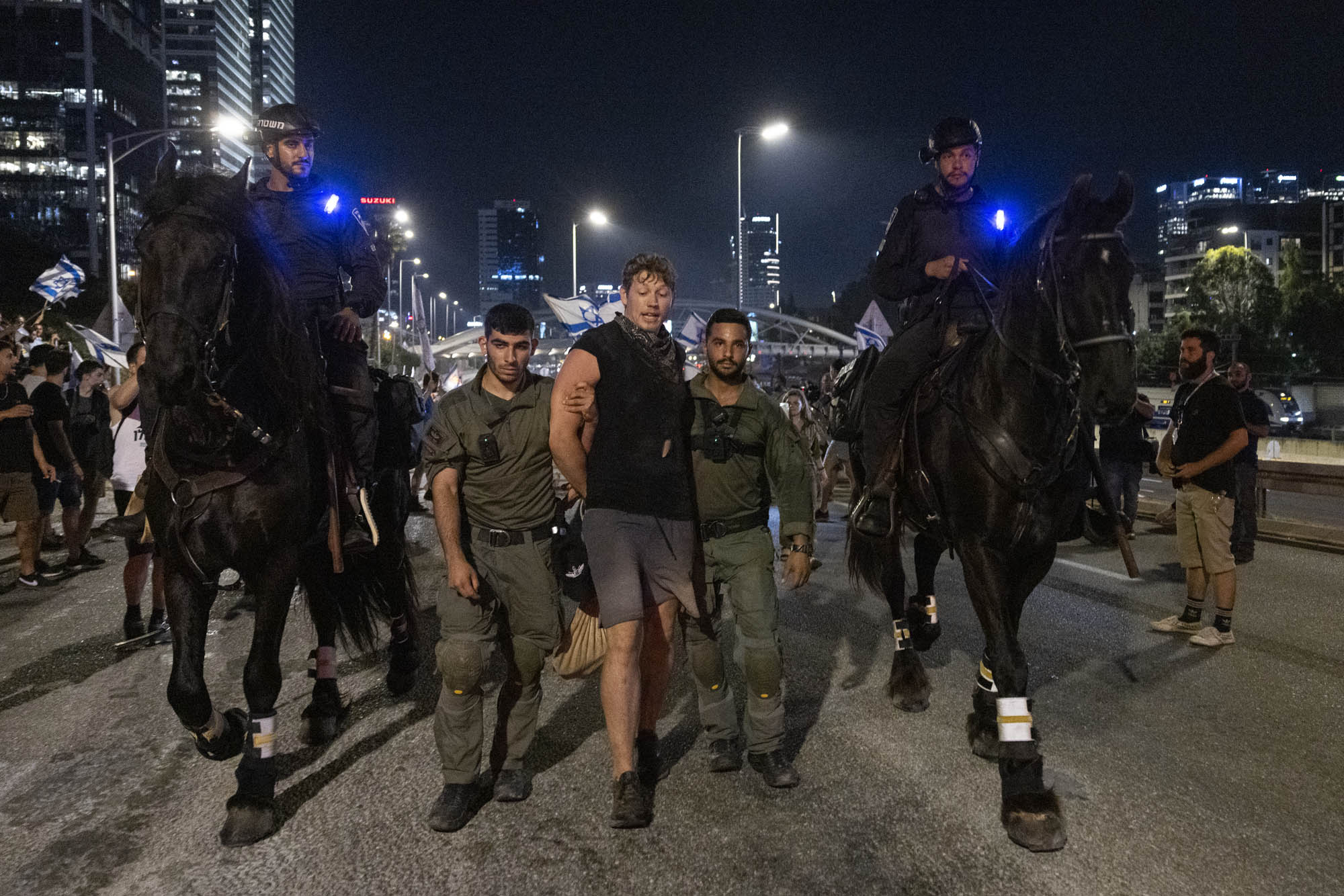
Better Pocker had also been at Balfour but not on the frontlines. She described her thought process after being “trampled by mounted police and pushed in the chest by Border Police officers” in March as a “chemical reaction.” “There is now authentic anger. People are saying: ‘Fuck it, the country is going to hell, I’m going down to Ayalon.”
For Yael, 18, the violence she experienced reminded her of the situation in the occupied territories. “Until now I hadn’t experienced this kind of violence as a Jew. Palestinians and others have suffered and are suffering from more severe violence than what is currently directed at us, but now, when it comes to the [Jewish] population, it generates media attention.”
The connection between police violence toward protesters and the violence of the occupation also arose when police dispersed protesters in Jerusalem using skunk water — a foul smelling liquid predominantly used on Palestinians in the West Bank and East Jerusalem, as well as ultra-Orthodox anti-draft protesters. When police fired it recently at anti-government demonstrators, one of them shouted: “The guys under occupation say that water and salt help!”
‘There will be no back to normal’
Most of those interviewed for this article said that what brought them out onto the streets was a feeling that Israel’s social contract had been violated. But if the social justice protests of 2011 voiced the demand to solve the housing and economic crisis, and Balfour called for Netanyahu’s resignation, this time the demand is broader and less concrete.
The day the government abolished the reasonableness standard, Guggenheim said, it proved “that it is illegitimate. Period.” For her, the core objective is that “the government dissolves. I don’t have other demands; I don’t see it as a partner for dialogue.”
In her eyes, however, the protest is much broader than overthrowing the far-right coalition or stopping the judicial overhaul. “Let’s imagine how we can create a constitution, and anchor human rights, freedom, and equality,” she said. “Let’s talk about everything: conscription, the occupation, rabbinic courts — once these issues are opened, they can’t be closed.”
“People closed their eyes, and now they are having them forcibly opened,” said Better Pocker. “Many people refused to see the context, but with events like Huwara, and Ben Gvir [in government], now it is difficult to ignore. The conversation has widened, and everyone is participating in it. I don’t have another passport; I have nowhere else to go.”
Yael agrees. The protest movement, she said, “has brought things out from under the carpet. The question is what to do with it. Until now there was some kind of compromise on the old order: going to the army and maintaining the status quo. As soon as you try to pull things in an extreme direction, it causes many to ask how we agreed to the order that existed here.”
Thus, she continued, “there is a possibility now for a turning point, a change in the order. There will be no ‘back to normal.’ We need to change the entire system, not just the government.”
A version of this article was originally published in Hebrew on Local Call. Read it here.

